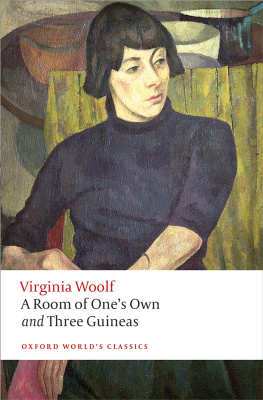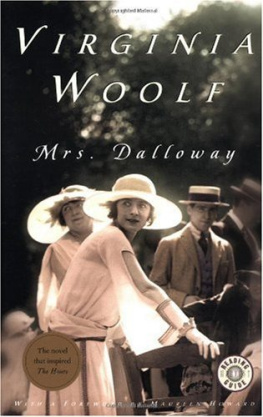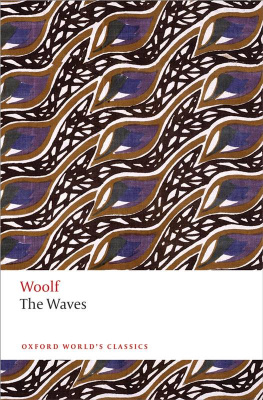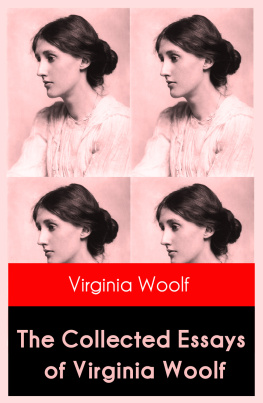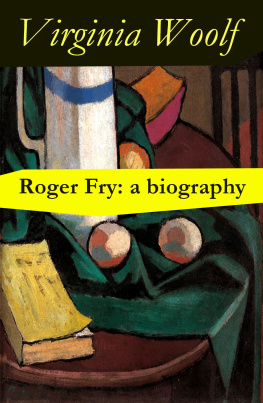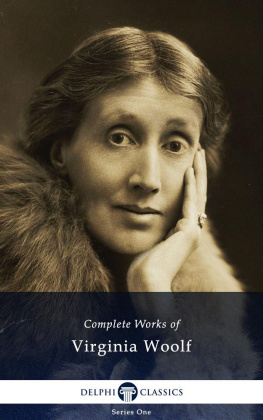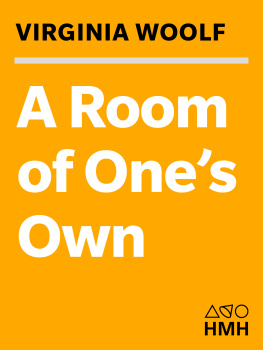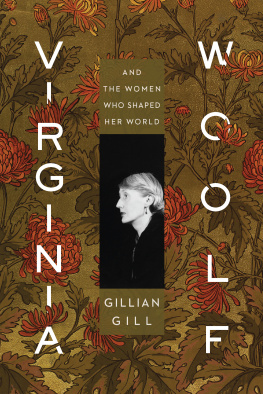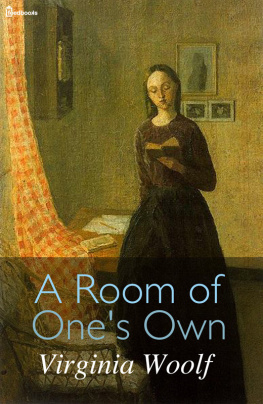Virginia Woolf - A Room of Ones Own (Penguin Books - Great Ideas)
Here you can read online Virginia Woolf - A Room of Ones Own (Penguin Books - Great Ideas) full text of the book (entire story) in english for free. Download pdf and epub, get meaning, cover and reviews about this ebook. year: 2004, publisher: Penguin Books, genre: Detective and thriller. Description of the work, (preface) as well as reviews are available. Best literature library LitArk.com created for fans of good reading and offers a wide selection of genres:
Romance novel
Science fiction
Adventure
Detective
Science
History
Home and family
Prose
Art
Politics
Computer
Non-fiction
Religion
Business
Children
Humor
Choose a favorite category and find really read worthwhile books. Enjoy immersion in the world of imagination, feel the emotions of the characters or learn something new for yourself, make an fascinating discovery.

- Book:A Room of Ones Own (Penguin Books - Great Ideas)
- Author:
- Publisher:Penguin Books
- Genre:
- Year:2004
- Rating:3 / 5
- Favourites:Add to favourites
- Your mark:
- 60
- 1
- 2
- 3
- 4
- 5
A Room of Ones Own (Penguin Books - Great Ideas): summary, description and annotation
We offer to read an annotation, description, summary or preface (depends on what the author of the book "A Room of Ones Own (Penguin Books - Great Ideas)" wrote himself). If you haven't found the necessary information about the book — write in the comments, we will try to find it.
A Room of Ones Own (Penguin Books - Great Ideas) — read online for free the complete book (whole text) full work
Below is the text of the book, divided by pages. System saving the place of the last page read, allows you to conveniently read the book "A Room of Ones Own (Penguin Books - Great Ideas)" online for free, without having to search again every time where you left off. Put a bookmark, and you can go to the page where you finished reading at any time.
Font size:
Interval:
Bookmark:
Virginia Woolf
18821941
Virginia Woolf
PENGUIN BOOKS GREAT IDEAS
PENGUIN BOOKS
Published by the Penguin Group
Penguin Books Ltd, 80 Strand, London WC2R 0RL , England
Penguin Group (USA) Inc., 375 Hudson Street, New York, New York 10014, USA
Penguin Books Australia Ltd, 250 Camberwell Road, Camberwell, Victoria 3124, Australia
Penguin Books Canada Ltd, 10 Alcorn Avenue, Toronto, Ontario, Canada M4V 3B2
Penguin Books India (P) Ltd, 11 Community Centre, Panchsheel Park, New Delhi 110 017, India
Penguin Group (NZ), Cnr Airborne and Rosedale Roads, Albany, Auckland 1310, New Zealand
Penguin Books (South Africa) (Pty) Ltd, 24 Sturdee Avenue, Rosebank 2196, South Africa
Penguin Books Ltd, Registered Offices: 80 Strand, London WC2R 0RL , England
www.penguin.com
A Room of Ones Own first published 1928
First published in Penguin Books 1945
Professions for Women first published in The Death of the Moth 1942
This edition published in Penguin Books 2004
Taken from the Penguin Classics edition of A Room of Ones Own and from the Penguin Classics edition The Crowded Dance of Modern Life: Selected Essays, Volume 2
Except in the United States of America, this book is sold subject to the condition that it shall not, by way of trade or otherwise, be lent, re-sold, hired out, or otherwise circulated without the publishers prior consent in any form of binding or cover other than that in which it is published and without a similar condition including this condition being imposed on the subsequent purchaser
ISBN: 978-0-14-196433-1
But, you may say, we asked you to speak about women and fiction what has that got to do with a room of ones own? I will try to explain. When you asked me to speak about women and fiction I sat down on the banks of a river and began to wonder what the words meant. They might mean simply a few remarks about Fanny Burney; a few more about Jane Austen; a tribute to the Bronts and a sketch of Haworth Parsonage under snow; some witticisms if possible about Miss Mitford; a respectful allusion to George Eliot; a reference to Mrs Gaskell and one would have done. But at second sight the words seemed not so simple. The title women and fiction might mean, and you may have meant it to mean, women and what they are like; or it might mean women and the fiction that they write; or it might mean women and the fiction that is written about them; or it might mean that somehow all three are inextricably mixed together and you want me to consider them in that light, But when I began to consider the subject in this last way, which seemed the most interesting, I soon saw that it had one fatal drawback. I should never be able to come to a conclusion. I should never be able to fulfil what is, I understand, the first duty of a lecturer to hand you after an hours discourse a nugget of pure truth to wrap up between the pages of your notebooks and keep on the mantelpiece for ever. All I could do was to offer you an opinion upon one minor point a woman must have money and a room of her own if she is to write fiction; and that, as you will see, leaves the great problem of the true nature of woman and the true nature of fiction unsolved. I have shirked the duty of coming to a conclusion upon these two questions women and fiction remain, so far as I am concerned, unsolved problems. But in order to make some amends I am going to do what I can to show you how I arrived at this opinion about the room and the money. I am going to develop in your presence as fully and freely as I can the train of thought which led me to think this. Perhaps if I lay bare the ideas, the prejudices, that lie behind this statement you will find that they have some bearing upon women and some upon fiction. At any rate, when a subject is highly controversial and any question about sex is that one cannot hope to tell the truth. One can only show how one came to hold whatever opinion one does hold. One can only give ones audience the chance of drawing their own conclusions as they observe the limitations, the prejudices, the idiosyncrasies of the speaker. Fiction here is likely to contain more truth than fact. Therefore I propose, making use of all the liberties and licences of a novelist, to tell you the story of the two days that preceded my coming here how, bowed down by the weight of the subject which you have laid upon my shoulders, I pondered it, and made it work in and out of my daily life. I need not say that what I am about to describe has no existence; Oxbridge is an invention; so is Fernham; I is only a convenient term for somebody who has no real being. Lies will flow from my lips, but there may perhaps be some truth mixed up with them; it is for you to seek out this truth and to decide whether any part of it is worth keeping. If not, you will of course throw the whole of it into the waste-paper basket and forget all about it.
Here then was I (call me Mary Beton, Mary Seton, Mary Carmichael or by any name you please it is not a matter of any importance) sitting on the banks of a river a week or two ago in fine October weather, lost in thought. That collar I have spoken of, women and fiction, the need of coming to some conclusion on a subject that raises all sorts of prejudices and passions, bowed my head to the ground. To the right and left bushes of some sort, golden and crimson, glowed with the colour, even it seemed burnt with the heat, of fire. On the further bank the willows wept in perpetual lamentation, their hair about their shoulders. The river reflected whatever it chose of sky and bridge and burning tree, and when the undergraduate had oared his boat through the reflections they closed again, completely, as if he had never been. There one might have sat the clock round lost in thought. Thought to call it by a prouder name than it deserved had let its line down into the stream. It swayed, minute after minute, hither and thither among the reflections and the weeds, letting the water lift it and sink it, until you know the little tug the sudden conglomeration of an idea at the end of ones line: and then the cautious hauling of it in, and the careful laying of it out? Alas, laid on the grass how small, how insignificant this thought of mine looked; the sort of fish that a good fisherman puts back into the water so that it may grow fatter and be one day worth cooking and eating. I will not trouble you with that thought now, though if you look carefully you may find it for yourselves in the course of what I am going to say.
But however small it was, it had, nevertheless, the mysterious property of its kind put back into the mind, it became at once very exciting, and important; and as it darted and sank, and flashed hither and thither, set up such a wash and tumult of ideas that it was impossible to sit still. It was thus that I found myself walking with extreme rapidity across a grass plot. Instantly a mans figure rose to intercept me. Nor did I at first understand that the gesticulations of a curious-looking object, in a cut-away coat and evening shirt, were aimed at me. His face expressed horror and indignation. Instinct rather than reason came to my help; he was a Beadle; I was a woman. This was the turf; there was the path. Only the Fellows and Scholars are allowed here; the gravel is the place for me. Such thoughts were the work of a moment. As I regained the path the arms of the Beadle sank, his face assumed its usual repose, and though turf is better walking than gravel, no very great harm was done. The only charge I could bring against the Fellows and Scholars of whatever the college might happen to be was that in protection of their turf, which has been rolled for 300 years in succession, they had sent my little fish into hiding.
Next pageFont size:
Interval:
Bookmark:
Similar books «A Room of Ones Own (Penguin Books - Great Ideas)»
Look at similar books to A Room of Ones Own (Penguin Books - Great Ideas). We have selected literature similar in name and meaning in the hope of providing readers with more options to find new, interesting, not yet read works.
Discussion, reviews of the book A Room of Ones Own (Penguin Books - Great Ideas) and just readers' own opinions. Leave your comments, write what you think about the work, its meaning or the main characters. Specify what exactly you liked and what you didn't like, and why you think so.


